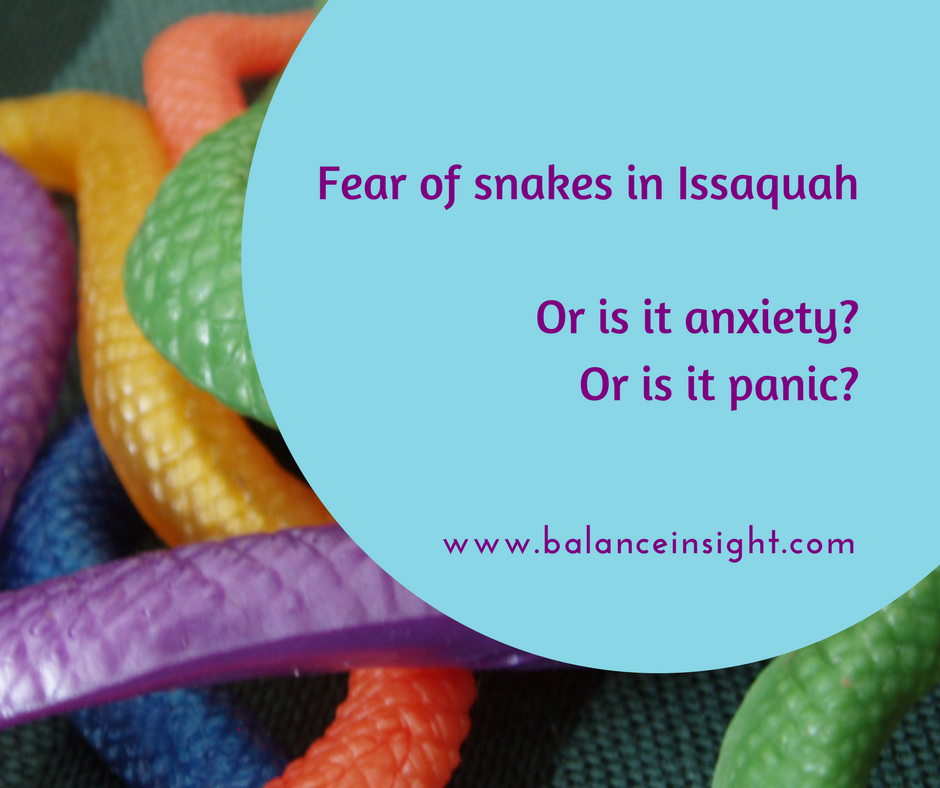Fear of snakes in Issaquah - Or is it anxiety? Or is it panic?
Since the weather here in the Pacific Northwest is growing warmer and less rainy, my family and I spent parts of Memorial weekend doing yard work, mowing, weed whacking, moving potted trees and plants, and collecting rocks from the side yard that we can use to line the chicken coop fencing.
I happen to be in the process of learning to get comfortable around snakes, and knowing my son’s house is in a woodsy, meadowy area I wore my Keens – you know those sneakers with the holes in them. Great, right? Great until I started picking up the stones and playing through in my mind what might happen if a snake came out from under them, and slithered toward me. Suddenly I realized that while the toes and sides of my shoes gave more protection than my flip flops would, the holes meant that snakes could slither right on up and in.
There’s fear, there’s anxiety, and there’s panic – and mild to moderate to extreme versions of all three of those. My feelings here seem to fit into the moderate fear to mild anxiety categories. If you startle when a snake crosses your path, that’s mild fear. No hyperventilating, and no nightmares later on about snakes chasing you. Fear might make you remember which kinds of snakes you’d see in Issaquah or Eastside might be venomous – the Western Rattlesnake is only east of the Cascades. Fear might make you plan. If you have fear, it definitely gets in the way of things, like hiking or feeling at ease, but it doesn’t traumatize you, give you stomach aches, immobilize you, or feel debilitating. Fear makes you plan.
Anxiety might cause you to wear boots, very tall boots. Even though you know snakes hibernate in winter you might avoid meadow areas or at least scan your path, noticing sticks and twigs, movement that might look like they could maybe possibly be a snake. You might wear gloves to work in the yard, or you might not work in the yard at all. You wouldn’t be likely to live in a house with rocky outcroppings or meadows. And if you did, you might replace it with a lawn and no place for snakes to hide. On vacations, you’d probably not tent camp and you’d likely steer clear of hiking or geocaching, unless it’s in snow. You might visit the Cougar Mountain Zoo (they have no snakes) but you might skip the Woodland Park Zoo. Or if you went, you’d avoid the python exhibit. Anxiety makes you avoid.
Full blown panic would keep you inside, period. You could go into flight, fight, or freeze mode if you saw a photo in a magazine. You might cry inconsolably, feel faint or nauseous, see snakes in every cord on the floor. Panic causes you to carefully plan where you’ll go, what you’ll wear, who you’ll trust. You can’t even stand to hear about snakes or you’ll have night terrors and have trouble getting movies of slithering sliminess out of your head. Panic makes you feel sick.
There’s nothing bad, broken, or weird about you - or any of us - for having fear, anxiety, or panic about anything in life. It’s just that living is more fun, varied, interesting, and full, if we aren’t physically sick with panic. We have fewer limits on what we can do or see if we don’t need to stay inside where it’s predictably (hopefully) safe. When you feel at ease in your environment, the world is truly at your fingertips.
Eye Movement Desensitization and Reprocessing Therapy (EMDR) can help you get rid of that sick feeling and keep it from coming back. It helps with all kinds of feelings and memories and is particularly helpful with anxiety and panic. I'll post more about long term remedies for fear, anxiety, and panic in the future, but for now try this help if you want to feel better in the moment. And if you'd like to talk in person about easing fear, anxiety, or panic call me to schedule a phone consultation to see how counseling can help.
What do you get fear, anxiety, or panic about? Comment below and I’ll reply. And please share this with anyone you think it might help. Feelings don't need to be debilitating.
As always, thanks for reading.

